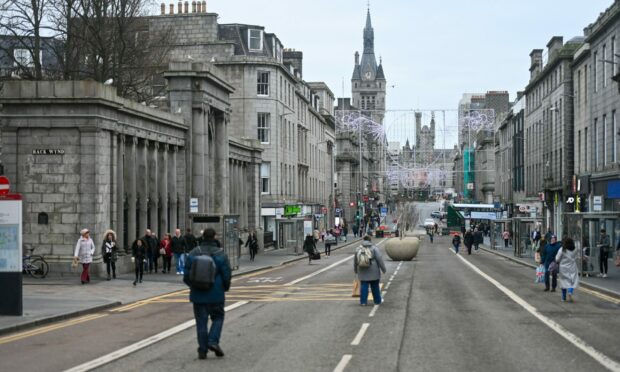A north-east business leader has said Aberdeen was the hardest hit of Scotland’s biggest cities during the pandemic.
Russel Borthwick, chief executive of Aberdeen and Grampian Chamber of Commerce, pointed to a report by think tank the Centre for Cities saying the downturn in city centre business was in part due to the “persistent lack of office workers”.
Mr Borthwick said the loosening of office working restrictions by First Minister Nicola Sturgeon gives an opportunity for towns and city centres, particularly Aberdeen, to again flourish.
But he warned that government-mandated hybrid working would hamper the fortune of co-called support business.
Phased return to hybrid working
Guidance urging people to work from home wherever possible in Scotland is to be relaxed from Monday.
Employers have been asked to phase workers back into spending some time in the office with a “hybrid” system of office and remote working.
Mr Borthwick was speaking on Wednesday’s Good Morning Scotland programme on BBC Radio Scotland, when he said the lifting of restrictions was a good news story but cautioned against the government mandating how it should happen.
“Research from the Fraser of Allander Institute highlights that 60% of employers report negative impacts from home working on productivity, innovation, collaboration and particularly on the development of our people and our young people specifically,” he said.
“[The return to offices] is also vital for our town and city centres which really have been crippled by the lack of footfall these restrictions have seen.
“So now we can have people back in offices beginning to revive the support economies on which our towns and city centres depend.”
Support economies refers to shops, cafe, bars and restaurants, and also the travel and car parking sectors.
Aberdeen has been hardest hit by Covid
Mr Borthwick said that Aberdeen had been the hardest hit city in Scotland when it came to the effects of lockdowns.
He said: “The Centre for Cities has talked about Aberdeen being hardest hit than any other big city in Scotland.
“Much of the problem, to quote them, is that the hardship ‘businesses in the centre of the city face is caused by a persistent lack of office workers’.”
He said it was “puzzling” that government continued to discuss future hybrid working models, that could continue to damage the fragile economy of towns and city centres.
He said: “Employees and employees are best placed to say what works for them.
“We should not be looking to force fundamental change on the way we live, work and relate to each other on the back of what was an emergency response.
“There needs to be a look by all parties on the role of our towns and city centres and what interventions are required to ensure we do not lose those eco systems because they are so important.
“Measures should be put in place that will mitigate the devastating impacts we have seen there so far,” he added.
